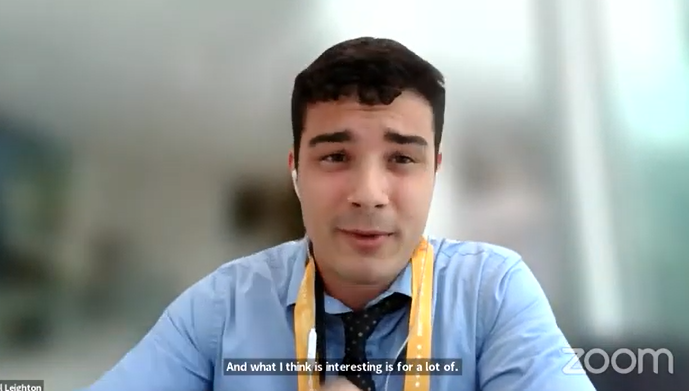Tech Influence Felt at GOP Convention in Milwaukee
With JD Vance potentially beside Trump in the White House, and with pro crypto and pro AI policies in the GOP platform, it’s not a stretch to imagine a Trump administration looking kindly toward emerging technologies.
Joel Leighton

Joel Leighton, a British subject who is an undergraduate at Brigham Young University in Utah, is interning with Broadband Breakfast this summer from Washington, D.C. Leighton attended the GOP Convention last week in Milwaukee, covering technology-related developments over the four days and paying close attention to the GOP's ties to the cryptocurrency sector. Below are some of Leighton's observations about attending his first American political convention.
The task of finding technology-related stories last week at the Republican National Convention, just days after the traumatic assassination attempt on former President Donald Trump in Pennsylvania, appeared daunting.
For delegates, donors, and voters, the purpose of the convention was to unify and consolidate the party behind a nearly-martyred Trump and win back the White House. Technology did not appear to be outwardly at the forefront of anyone's thinking.
That is what I thought flying into Milwaukee on Sunday night, July 14. But a week later I left the Republican Party event with a newfound awareness of a whole other conversation going on within the GOP – the influence of Silicon Valley.
For those with eyes to see and ears to hear, the broader tech world and some of its influential leaders were there in an effort to influence policy in a second Trump administration. They clearly hoped that their ideas and capital could influence the outcome on Nov. 5 and perhaps beyond.
It wasn’t hard to see the tech lobby in action.
Away from the main convention halls were the Blockchain Sessions, a series of cryptocurrency fireside chats and seminars about the technology’s future with a Republican in the White House.
Venture capitalists and tech innovators hiked from the perimeter of the Fiserv Forum to the top of a local coffee shop in the Wisconsin city’s downtown. I found many attendees nibbling on hors d'oeuvres, chatting optimistically about a more crypto-friendly approach from a second Trump administration compared to the current Biden administration.
In the 2024 platform, the GOP promised to end the Democratic Party's “unlawful and unamerican crypto crackdown,” and to protect the right to mine crypto and keep transactions surveillance free.
Judging by the enthusiastic nods received whenever it was mentioned in the sessions, the platform's most popular crypto promise was the commitment to prevent the creation of a Central Bank Digital Currency.
Within the industry, there has been debate about whether Trump is genuinely committed to a new regulatory framework designed to unlock innovation, or the GOP’s current leadership has been merely flirting with the industry in order to receive financial support.
Christopher Giancarlo, a crypto advocate and a former chairman of the Commodity Futures Trading Commission under Trump, predicted Trump will embrace the technology's potential because of his commitment to economic growth.
Others were skeptical. On Broadband Breakfast Live Online panel last Wednesday in which I participated, Jennifer Schulp, director of financial regulation studies at the libertarian Cato Institute, noted that simply appearing pro-crypto was not a high bar when compared to the skeptical Biden administration.
However, another factor has seemingly rewarded tech innovators’ faith in a new Trump administration: JD Vance. While most know Vance as the author of “Hillbilly Elegy” and a freshman Senator from Ohio, Vance also previously lived in San Francisco for two years to work as a venture capitalist.
Just a day after the announcement, Giancarlo said Vance’s joining the team as Trump’s running mate was good news for tech.
“Vance has been notably positive on crypto -- some of his online lectures show a real familiarity and a real appreciation,” Giancarlo said.
Elon Musk, the richest man in the world from his investments in the rocket company SpaceX and electric carmaker Tesla, said on his X account that the Trump-Vance ticket “resounds with victory.”
Venture capitalist David Sacks, who raked in $12 million for Trump in a recent fundraiser, reposted a X post supporting JD Vance as Vice President. One such reason was because he was a “successful tech investor.”
While there is an ideological crossover between venture capitalists and the laissez-faire Republican approach, it’s possible some of these Silicon Valley voices are also simply detecting where the wind could be blowing with the electorate.
After Biden’s poorly received debate performance against Trump on June 27, billionaire and Google investor Bill Ackman, who initially supported Rep. Dean Phillips', D-Minn., primary challenge against Biden, said on his X account “[Trump] is going to win in a landslide. The country should rally around Trump and help him succeed.” Ackman gave $1 million to the Phillips campaign.
Musk, who has received numerous federal subsidies for his tech ventures, endorsed Trump immediately after the assassination attempt and reportedly pledged $45 million a month to his campaign.
Whether the GOP's newfound Silicon Valley allies will ultimately influence the party with their money or GOP leaders will accept support from tech tycoons but deliver only a tepid approach to innovation remains to be seen.
But with Vance potentially beside Trump in the White House, and pro crypto and pro AI policies in the GOP platform, it’s not a stretch to imagine a Trump administration looking kindly toward emerging technologies.











Member discussion